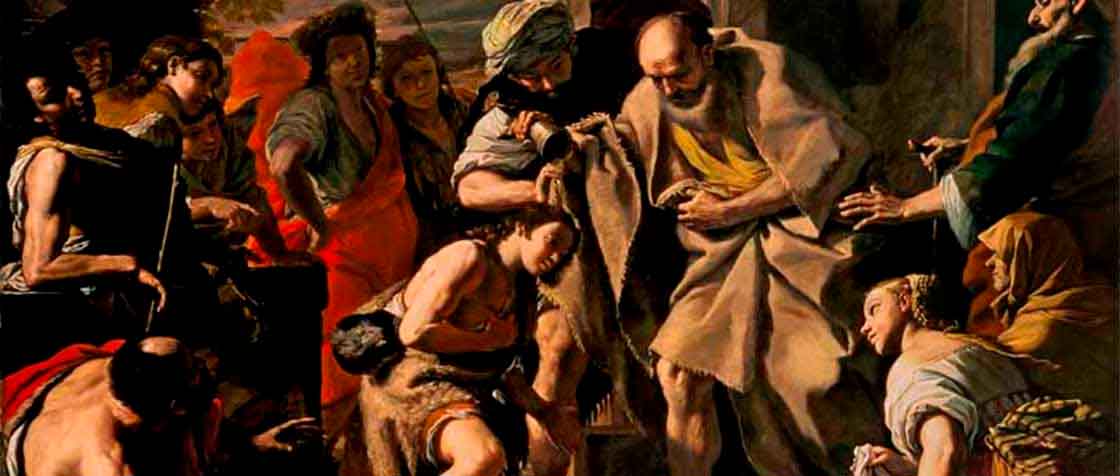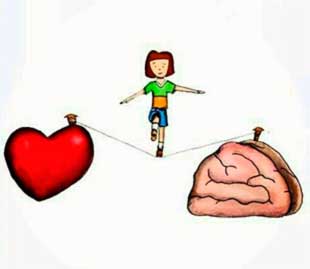
Antonio Roldán Cambil
The weight of the heart

Kilian Jornet, winner of the Hardrock, a very tough mountain race of 100 miles (more than 160 km).
At km. 21 he dislocated a shoulder in a fall (he repositioned it himself) and continued another 140 km. more, and even won the race (with a time of 24 h. and 32 m.).
What motivated this young sportsman such determination and sacrifice?
What drove him to continue injured and even to win?
According to the Guide to the Study of the Scriptures, the heart is a symbol of man’s disposition and will and, in a figurative sense, the source of all emotion and all feeling.
The weight of the heart
The heart in Egyptian culture

When an Egyptian died, the god Anubis, god of the dead, welcomed the dead at the gates of their tombs, guiding them to the Hereafter.
Once in the «Room of the Two Truths», Anubis is in charge of carrying the deceased so that his soul may be heavy, watching the faithful of the scale so that no one can falsify it, during the trial of Osiris.
The weight of the heart is a symbolic representation, the heart represents the life that the deceased lived; for the ancient Egyptians the heart was the place of thought, emotion and life itself. The Egyptians thought, when the time of death came, that if a man had lived and acted in accordance with Maat (goddess of justice), that is, had adjusted his existence to truth and justice, when he died his life was secured in the hereafter forever. Now, if man had not been just, that is, if he had much attachment to the material and many vices, the heart will be heavy, and then devoured by the monster that represents material nature, where everything dies and is born.
Chapter 125 of the «Book of the Dead» explains the moment of the weight of the heart: «The individual, in the presence of Osiris, Lord of the Two Maat, and 42 other gods, was to give a solemn declaration of innocence and, immediately afterwards, his heart was weighed down before Maat. On one of the scales the heart was placed, while on the other an ostrich feather, symbol of Maat, was placed. The heart, if it was fair, should weigh less than the feather. Thot (the scribe god) recorded the result on a tablet and declared in his case the deceased «just of voice». In another case, a monstrous being devoured the deceased, returning him to the world of matter where he would encounter the consequences of his actions.
Heart, mind and action

There is an important relationship between the heart (the feelings), the mind (the thoughts) and the hand (the actions), which God knows and teaches us in the scriptures:
«For as he thinketh in his heart» (Proverbs 23:7).
And we read in Job
«If thou prepare thine heart, and stretch out thine hands toward him;
If iniquity be in thine hand, put it far away, and let not wickedness dwell in thy tabernacles.
For then shalt thou lift up thy face without spot; yea, thou shalt be steadfast, and shalt not fear: Because thou shalt forget thy misery, and remember it as waters that pass away:
And thine age shall be clearer than the noonday; thou shalt shine forth, thou shalt be as the morning.And thou shalt be secure, because there is hope; yea, thou shalt dig about thee, and thou shalt take thy rest in safety.
Also thou shalt lie down, and none shall make thee afraid; yea, many shall make suit unto thee.» (Job 11: 13-19).
In proverbs
«My son, attend to my words; incline thine ear unto my sayings.
Let them not depart from thine eyes; keep them in the midst of thine heart.
For they are life unto those that find them, and health to all their flesh.
Keep thy heart with all diligence; for out of it are the issues of life.» (Proverbs 4:20-23)
And in Lucas we read
«But rather seek ye the kingdom of God; and all these things shall be added unto you.
Fear not, little flock; for it is your Father’s good pleasure to give you the kingdom.
Sell that ye have, and give alms; provide yourselves bags which wax not old, a treasure in the heavens that faileth not, where no thief approacheth, neither moth corrupteth.
For where your treasure is, there will your heart be also.» (Luke 12:31-34).
Image of Tefillin or Filacteria

In the Old Testament the Lord instructed the people of Israel to keep the remembrance of their God, and the miracles He performed to deliver them from Egypt.
In the time of Jesus Christ (and today), TEFILLIN (prayers) or FILACTERIES were used, two small leather boxes tied to the forehead, arm and middle finger of the left hand by means of leather straps and containing passages from Deuteronomy and Exodus.
«Hear, O Israel: The Lord our God is one Lord:
And thou shalt love the Lord thy God with all thine heart, and with all thy soul, and with all thy might. And these words, which I command thee this day, shall be in thine heart:
And thou shalt teach them diligently unto thy children, and shalt talk of them when thou sittest in thine house, and when thou walkest by the way, and when thou liest down, and when thou risest up.
And thou shalt bind them for a sign upon thine hand, and they shall be as frontlets between thine eyes…» (Deut. 6:4-8)
Tefillin is one of the most important mitzvot (precepts) of the Torah. It has been observed and treasured for thousands of years, to the present day. The Torah mentions it more than once, but more explicitly in Deuteronomy 6:8 «Thou shalt bind them as a sign upon thy arm, and they shall be a reminder between thine eyes.
Meaning of Tefillin
Tefillin consists of two small leather boxes attached to leather straps. Each of the two boxes contains four sections of the Torah written on parchment. Those passages are:
- a) (Deuteronomy 6:4-9) – which proclaims the Oneness of the One God.
- b) (Deuteronomy 11:13-21) – which expresses God’s promise that He will reward us if we continue to observe the precepts of the Torah, and warns us of the retribution for disobeying them.
- c) (Exodus 13:1-10)-the duty of the Jewish people to always remember the redemption of Egyptian servitude.
- d) (Exodus 13:11-16)-the obligation of every Jew to inform his children of this.

One of the boxes («arm tefillin») is placed on the left arm so that it is in front of the heart – the place of emotions, and the leather strap is wrapped around the left hand, and around the middle finger of that hand. The other box (the «head tefillin») is placed over the head, above the forehead, thus resting on the brain. In this way our attention is directed to the head, heart and hand. This teaches us to dedicate ourselves to the service of God in everything we think, feel and do. It also teaches us not to be governed solely by the impulses of the heart, lest this lead to error and transgression. Nor to be governed only by reason, for this can lead to crude materialism.
Placed on the arm opposite the heart and above the head, tefillin means submission of the mind, heart and actions to the Almighty, as well as the government of the intellect over the emotions (passions).
The heart in the last dispensation
Joseph Smith the prophet began the preliminaries of this dispensation with the sincere heart desires of a young man who, after having read in the epistle of James 1:5, felt.
«No passage of Scripture ever penetrated the heart of a man stronger than this one on this occasion, mine. It seemed to enter with immense power into every fiber of my heart. I meditated on it repeatedly, knowing that if anyone needed wisdom from God, that person was me;
I knelt down and began to raise to God the desire of my heart.
I was answered that I should not join any, because they were all in error; and the Personage who spoke to me said that all his creeds were an abomination in his sight; that all those professors had perverted themselves; that «with their lips they honor me, but their heart is far from me» (Joseph Smith- History).
The why of a change of heart
Some scriptures that tell us about this change of heart
«For I, the Lord, will judge all men according to their works, according to the desire of their hearts.» (D&C 137:9)
In the Book of Mormon we read
«If so, his faith and hope is vain, for none is acceptable before God, save the meek and lowly in heart;» (Moroni 7:44).

«And ye shall offer for a sacrifice unto me a broken heart and a contrite spirit. And whoso cometh unto me with a broken heart and a contrite spirit, him will I baptize with fire and with the Holy Ghost, even as the Lamanites, because of their faith in me at the time of their conversion, were baptized with fire and with the Holy Ghost, and they knew it not.» (3 Nefi 9:20)
«And now behold, I ask of you, my brethren of the church, have ye spiritually been born of God? Have ye received his image in your countenances? Have ye experienced this mighty change in your hearts?»(Alma 5:14)
Por último Isaías nos dice
«Wash you, make you clean; put away the evil of your doings from before mine eyes; cease to do evil;
Learn to do well; seek judgment, relieve the oppressed, judge the fatherless, plead for the widow. Come now, and let us reason together, saith the Lord: though your sins be as scarlet, they shall be as white as snow; though they be red like crimson, they shall be as wool. » (Isaías 1: 16-18)
Meaning of mercy
Derived from Latin, the word mercy means compassion for those who suffer. It is composed of miser (unfortunate, which generates compassion) and cordis (heart) referring to the capacity, quality or virtue of feeling or perceiving the unhappiness of others, that is, of having feelings (heart) for someone unfortunate.

For that reason CHARITY, or the pure love of Christ is the central act of EXPIATION, by putting on the other side of the scale of justice the MERCY, coming to require the same of us, through a change of heart.
«And now, the plan of mercy could not be brought about except an atonement should be made; therefore God himself atoneth for the sins of the world, to bring about the plan of mercy, to appease the demands of justice, that God might be a perfect, just God, and a merciful God also.» (Alma 42:15).
«But God ceaseth not to be God, and mercy claimeth the penitent, and mercy cometh because of the atonement; and the atonement bringeth to pass the resurrection of the dead; and the resurrection of the dead bringeth back men into the presence of God; and thus they are restored into his presence, to be judged according to their works, according to the law and justice.
For behold, justice exerciseth all his demands, and also mercy claimeth all which is her own; and thus, none but the truly penitent are saved.» (Alma 42:23-24).
His heart is far from me
Some time ago, my concept of the expression: «With their lips they honor me but their heart is far from me» (Joseph Smith-History) was applied to those sects of the early 1820s but, with time, I think we must reflect and meditate if it could not also be applied, at some point in our lives, to ourselves.
Not only are thoughts important, but what YOU WANT to think.
«If you can control your thoughts, you can overcome habits, even degrading personal habits. If you can learn to master them you will have a happy life.» (Boyd K. Packer General Conference October 1973 Inspiring music: worthy thoughts).
The change of heart

The service :
«For how knoweth a man the master whom he has not served, and who is a stranger unto him, and is far from the thoughts and intents of his heart?» (Mosiah 5:13)
Sincerity:
«And when ye shall receive these things, I would exhort you that ye would ask God, the Eternal Father, in the name of Christ, if these things are not true; and if ye shall ask with a sincere heart, with real intent, having faith in Christ, he will manifest the truth of it unto you, by the power of the Holy Ghost.» (Moroni 10:4).
Purity:
«Create in me a clean heart, O God; and renew a right spirit within me.» (Psalm 51:10)
Gratitude:
«I, the Lord, am willing, if any among you desire to ride upon horses, or upon mules, or in chariots, he shall receive this blessing, if he receive it from the hand of the Lord, with a thankful heart in all things.» (D&C 62:7) .
«Gratitude is the memory of the heart» (Lao Tse).
Desire or disposition:

The heart is the symbol of disposition.
In sacramental prayer we can read the following :
«O God, the Eternal Father, we ask thee in the name of thy Son, Jesus Christ, to bless and sanctify this bread to the souls of all those who partake of it, that they may eat in remembrance of the body of thy Son, and witness unto thee, O God, the Eternal Father, that they are willing to take upon them the name of thy Son, and always remember him and keep his commandments which he has given them; that they may always have his Spirit to be with them. Amen.» (D&C 20: 77).
Meekness and humility:
«If so, his faith and hope is vain, for none is acceptable before God, save the meek and lowly in heart; and if a man be meek and lowly in heart, and confesses by the power of the Holy Ghost that Jesus is the Christ, he must needs have charity; for if he have not charity he is nothing; wherefore he must needs have charity.» (Moroni 7 : 44).
In general, all the qualities necessary to exercise priesthood authority are also necessary to change our heart through the influence of the Holy Spirit.
It is in the family that we can best see where we are in that process of change; develop our qualities and temper, reduce and eliminate defects.
Perhaps because of this, the Old Testament closes with powerful statements that have the heart as a central element:
«Behold, I will send you Elijah the prophet before the coming of the great and dreadful day of the Lord:
And he shall turn the heart of the fathers to the children, and the heart of the children to their fathers, lest I come and smite the earth with a curse.» (Malachi 4:5)
In the name of Jesus Christ. Amen

Dejar una contestacion